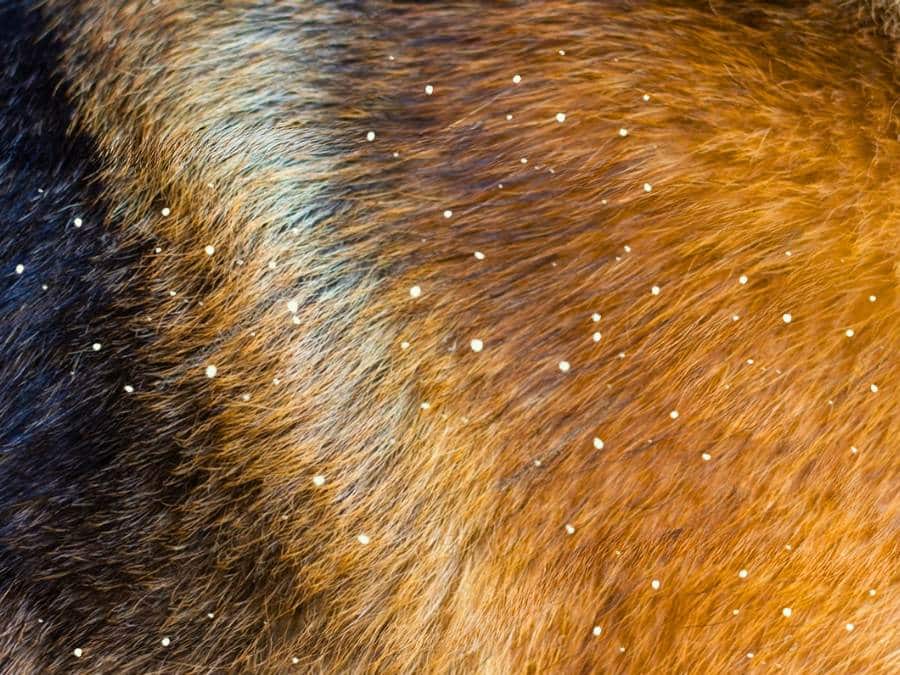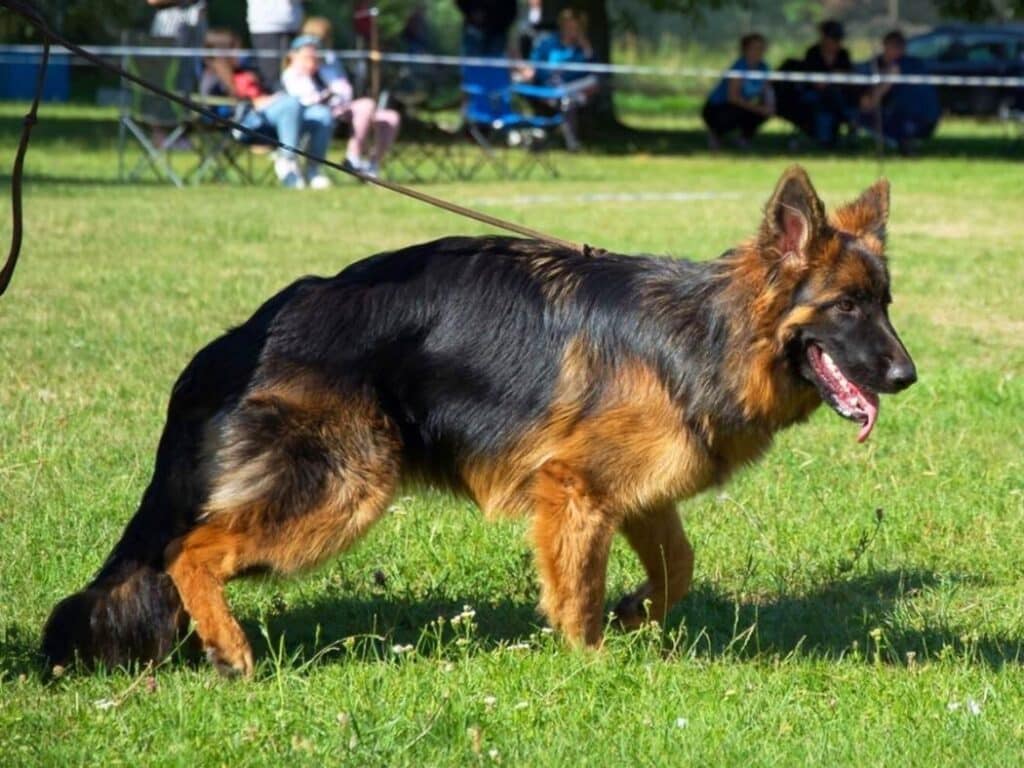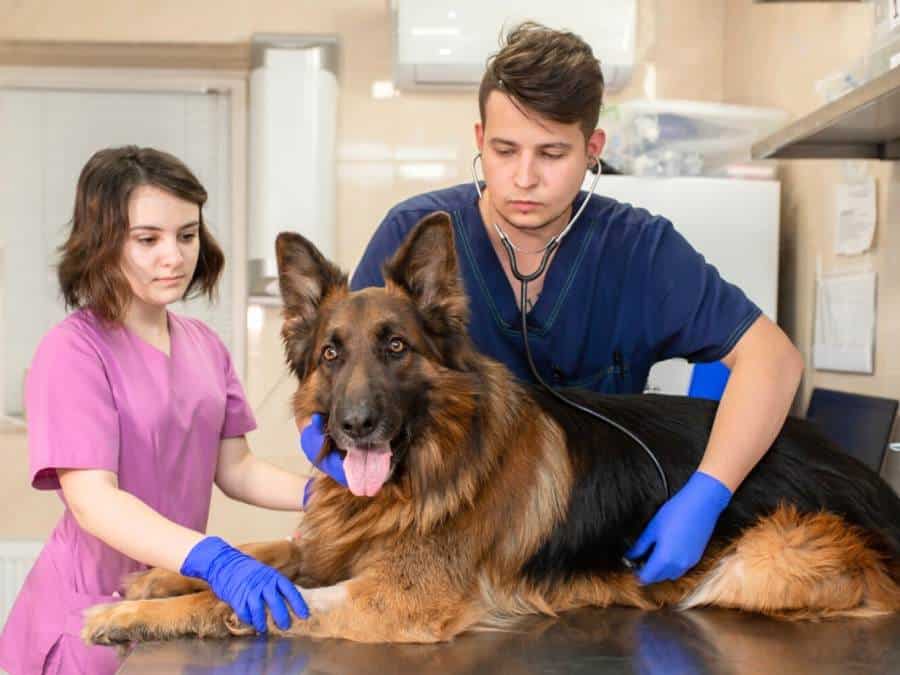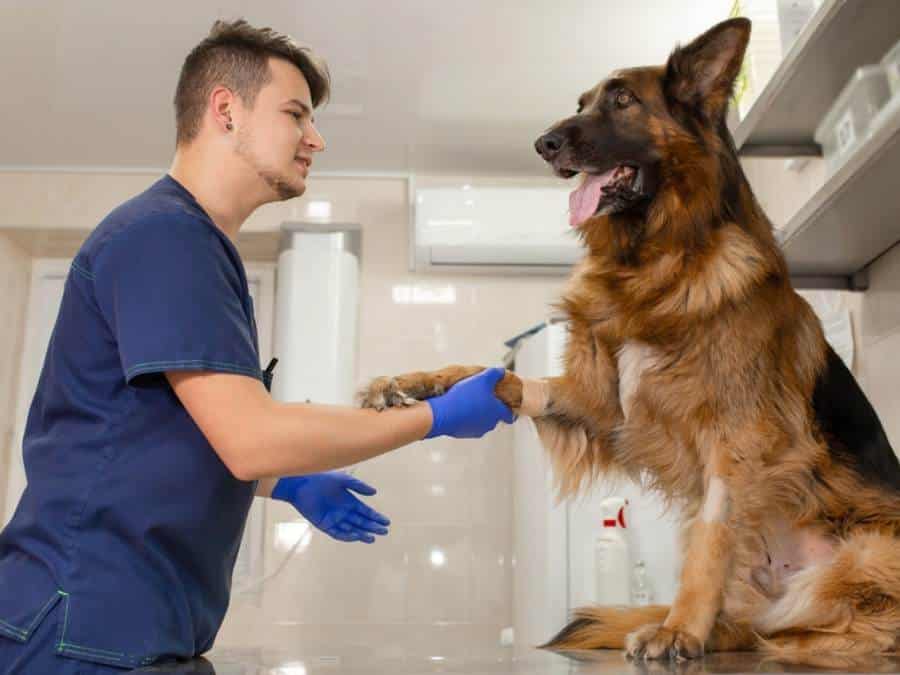Dandruff in German Shepherds is a common but often overlooked issue that is characterized by flaky skin and, sometimes, an itchy coat. However, it’s more than just a cosmetic concern—it can be indicative of underlying health issues.
Understanding, preventing, and treating dandruff is crucial for maintaining your German Shepherd’s skin and coat health, which in turn contributes to their overall well-being.
This blog post aims to provide a comprehensive guide to identifying, and managing dandruff in German Shepherds, offering insights into causes, symptoms, prevention, and treatment options.
Do German Shepherds Get Dandruff?
Yes, they do. Dandruff, or seborrheic dermatitis, is common in dogs and humans alike.
Dandruff in dogs is a condition where you might notice white or sometimes yellowish flakes in your dog’s coat, which are essentially dead skin cells being shed.
While in humans dandruff usually affects the head, in dogs one of the most common places is the back (especially toward the tail).
You may also notice that your German Shepherd’s skin is dry and be able to see it flake when giving him a good scratch.
However, not all dandruff in dogs looks like white flakes. It can be either dry or oily, or it may not even be dandruff.
Here are the most common types:
- Dry dandruff (Seborrhea sicca): This dry dandruff may appear as white flakes with crusty skin.
- Oily dandruff (Seborrhea oleosa): Your dog’s skin may have an oily feel and give off an odor.
- Walking dandruff: If the dandruff seems like it’s moving, this is called Cheyletiella and is a type of mite.

What Causes Dandruff in German Shepherds?
Dandruff in German Shepherds can stem from various factors ranging from environmental conditions to health issues.
Understanding these causes is crucial for identifying the best approach to alleviate the problem and enhance the dog’s skin and coat health.
Dry Air
Dry air, especially during winter months when heaters are frequently used, can lead to dehydrated skin, resulting in dandruff. This condition is exacerbated in environments with low humidity, as the lack of moisture in the air can cause the skin to become dry and flaky.
Obesity and Nutritional Issues
Nutritional deficiencies, particularly a lack of essential fatty acids in the diet, can contribute to poor skin health and dandruff. Omega-3 and omega-6 fatty acids are crucial for maintaining a healthy, moisturized skin and coat.
Additionally, obesity can exacerbate skin issues, as it may lead to increased skin folds, trapping dirt and oils and leading to irritation and flakiness.
Skin Infections
Bacterial or fungal infections can cause significant skin irritation and inflammation, leading to dandruff. These infections disrupt the natural balance of the skin’s ecosystem, causing excessive flaking and sometimes itching.
Allergies
Allergies to food, environmental allergies (like pollen, dust), or flea bites can trigger skin reactions in German Shepherds, resulting in itchy, flaky skin. The constant scratching due to itchiness can further damage the skin, exacerbating the dandruff problem.
Hormonal Conditions
Hormonal imbalances, such as those seen in Cushing’s disease or hypothyroidism, can significantly affect a dog’s skin health.
Cushing’s disease, which involves an overproduction of cortisol, can lead to thinning skin and increased susceptibility to infections, while hypothyroidism can cause the skin to become coarse and flaky.
Idiopathic Seborrhea
Some dogs may suffer from idiopathic seborrhea, a condition without a known cause, where the skin produces excess sebum and skin cells. This leads to either oily or dry dandruff and requires veterinary management to control the symptoms.
Over or Under Grooming
Proper grooming is essential for maintaining healthy skin and coat. Over-grooming, particularly with harsh shampoos, can strip the skin of its natural oils, leading to dryness and flakiness.
Conversely, under-grooming can allow oils and dead skin to build up, also causing dandruff.
Each of these factors contributes to the complex issue of dandruff in German Shepherds. Addressing the underlying cause, whether it’s adjusting the diet, improving grooming habits, or treating a medical condition, is essential for resolving dandruff and improving the dog’s overall well-being.

German Shepherd Dandruff Treatment
Treating dandruff in German Shepherds involves addressing the underlying causes while also providing relief to symptoms like itchiness and flakiness. A multifaceted approach that combines proper grooming, diet adjustments, and possibly medical treatments is often the most effective.
Here are key strategies for treating dandruff in German Shepherds:
Improved Grooming Practices
- Regular Brushing: Brush your dog regularly to remove dead skin cells and loose hairs, which can help reduce dandruff. You may try this FURminator de-shedding tool or products like de-matting brushes and shine/condition soft-bristle brushes.
- Use Appropriate Shampoo: Use a mild, moisturizing shampoo formulated for dogs. Medicated shampoos can be particularly helpful. You can use this Curaseb Benzoyl Peroxide Dog Shampoo along with Warren London Hydrating Butter Conditioner to relieve your dog from dandruff.
Nutritional Support
- Omega-3 and Omega-6 Fatty Acids: Incorporating foods rich in essential fatty acids into your German Shepherd’s diet can help improve skin health and reduce dandruff. Fish oil supplements such as Nordic Naturals Omega-3 for Pets are a popular and effective way to provide these nutrients.
- Balanced Diet: Ensure your dog’s diet includes all necessary vitamins and minerals. A high-quality, balanced commercial dog food is usually adequate, but some German Shepherds may require supplements, especially if they have specific health needs.
Environmental Adjustments
- Humidity: Keeping the air in your home moist with a humidifier such as the AquaOasis Cool Mist Humidifier can help prevent your German Shepherd’s skin from drying out, especially in winter or in dry climates.
- Stress Reduction: Like humans, dogs can experience stress-related skin issues. Providing a calm, stable environment and regular exercise can help minimize stress-induced dandruff.
Oatmeal Baths
Oatmeal baths are a well-known treatment for dandruff and are easy to do at home. Mix 1 cup of uncooked, finely-ground oatmeal, 1/2 cup of baking soda, and 1 quart of warm water in a large bowl. Mix the ingredients thoroughly.
Wet your German Shepherd with warm water, slowly add the oatmeal mixture, and lather as you would shampoo. Allow the mixture to sit on your dog’s skin for several minutes before rinsing.
Cheyletiella Treatment
Walking dandruff or Mites require extensive treatment because they can live up to 10 days on everyday objects.
- Your dog with mites should be bathed 6 to 8 times a week. The vet may prescribe rinses containing insecticide and lime sulfur, along with oral medication.
- Bedding, kennels, and rugs should be cleaned to prevent re-infestation.
When treating dandruff, it’s important to be patient and consistent. Many treatments, especially dietary changes and supplements, can take several weeks to show noticeable improvements.

When to See the Vet for Your German Shepherd’s Dandruff
If your German Shepherd just has mild seasonal or occasional dandruff, it’s probably nothing to worry about. If, however, your GSD exhibits signs of dry, flaky skin along with the following symptoms, head to the vet for a physical examination:
- Itchiness
- Skin odor
- Excessive amounts of dandruff
- Loss of hair/fur
- Irritated, red skin
- Excessive licking of paws or legs
- Other signs of illness or discomfort
When home remedies and over-the-counter treatments are not sufficient to control your German Shepherd’s dandruff, it’s crucial to seek professional veterinary care.
A veterinarian can offer expert advice and tailored treatment options that address the underlying cause of dandruff, ensuring your dog receives the best possible care.
What to Expect During the Vet Visit
The vet will likely conduct a thorough physical examination and may perform diagnostic tests such as skin scrapings, fungal cultures, or allergy tests to pinpoint the exact cause of the dandruff.
Be prepared to discuss your dog’s diet, grooming routine, and any recent changes in their health or environment.
Possible Prescriptions and Treatments
Depending on the diagnosis, your vet may prescribe medicated shampoos, topical ointments, oral medications, or dietary supplements.
In cases where an underlying health condition is identified, such as a hormonal imbalance or allergy, specific treatments will be recommended to address those issues directly.

How to Prevent Dandruff in German Shepherds
Preventing dandruff in German Shepherds is key to maintaining their overall skin and coat health. By implementing a proactive care routine, you can minimize the risk of dandruff developing or worsening.
Here are effective strategies to keep your German Shepherd’s skin healthy and dandruff at bay:
Maintain a Balanced Diet
- Nutritional Support: Ensure your dog’s diet is rich in essential nutrients that promote healthy skin and coat. Omega-3 and omega-6 fatty acids, found in fish oil and flaxseed oil, are particularly important for maintaining skin hydration and reducing inflammation.
- High-Quality Foods: Feed your GSD high-quality commercial food or a well-balanced homemade diet formulated to meet their specific nutritional needs. Consult with a veterinarian or a pet nutritionist to select the best diet plan for your dog.
Regular Grooming
- Brushing: Regular brushing helps to distribute natural oils evenly throughout your GSD’s coat, removing dead skin cells and preventing flake buildup. Choose a brush type that is appropriate for your dog’s coat and brush gently to avoid irritating the skin.
- Bathing: Bathe your dog with a mild, moisturizing dog shampoo. If your dog is prone to dandruff, consider using a specially formulated dandruff or oatmeal shampoo. However, avoid overbathing, as it can strip the skin of its natural oils and exacerbate dryness.
Optimize Your GSD’s Living Environment
- Humidity Levels: Dry air, especially during winter, can dehydrate your dog’s skin. Using a humidifier in your home can help maintain optimal humidity levels, keeping your dog’s skin hydrated.
- Clean and Comfortable Surroundings: Regularly clean your dog’s bedding, toys, and living spaces to reduce the risk of skin irritations caused by dust, mites, or other allergens.
Monitor Health and Well-being
- Regular Check-ups: Routine veterinary check-ups can help identify and address any underlying health issues that may contribute to skin problems, including dandruff.
- Stress Management: High stress levels can impact your dog’s skin health. Provide a stable, comforting environment and regular exercise to help manage stress.
Consider Supplements
- Skin and Coat Supplements: Supplements containing fish oil, biotin, zinc, or vitamins A and E can support skin health. Always consult your veterinarian before adding any supplements to your dog’s diet to ensure they are appropriate and safe.
By following these preventative measures, you can significantly reduce the risk of dandruff in your German Shepherd.
Final Remarks
I hope this comprehensive guide has equipped you with the knowledge and tools needed to tackle dandruff in your German Shepherd effectively. By understanding the condition, implementing preventative measures, and seeking professional care when needed, you can ensure your dog’s coat remains healthy and dandruff-free.
FURTHER READING:




